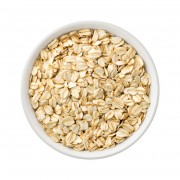Why oats and coeliac disease don’t mix
Study examines toxicity of oats for coeliac patients

Beyond its status as the latest dietary fad, the gluten-free diet is serious business for the small percentage of the population that suffer from coeliac disease.
Researchers have published a 10-year study in Journal of Autoimmunity that sheds light on why some coeliac sufferers have an allergic reaction to oats, a gluten-free grain. The team has succeeded in identifying the key components in oats that trigger this immune response.
Coeliac disease, or a serious allergy to the gluten protein found in wheat, barley and rye, is commonly associated with unpleasant gastrointestinal symptoms such as vomiting and diarrhoea – a side effect of the damage that gluten causes to the small intestine. Patients suffering from the disease must adhere to a gluten-free diet for their entire lives.
Previously, it was a much-debated mystery why some coeliac sufferers complained of allergic reactions to oats, despite the food’s lack of gluten. Cross contamination of grains in factories was erroneously believed to be the cause of oat toxicity, reported Emaxhealth.
While oats are considered gluten-free, eight percent of the 73 coeliac sufferers in the study had a reaction to consuming them, similar to reactions to barley consumption. The findings of the study reveal that oats contain storage proteins called avenins, similar to gluten, which appear to be causing the reactions.
"The significance of previous studies performed in test tubes was unclear," researcher Dr Melinda Hardy said in a press release. "By studying people with coeliac disease who had eaten oats, we were able to undertake a detailed profile of the resultant immune response in their blood stream. Our study was able to establish the parts of oat avenins that cause an immune response in people with coeliac disease."
This study could hopefully lead to improved oat toxicity tests and even the development of new coeliac treatments.
This article first appeared in the January 2015 issue of Global Health and Travel.
Further links:
Eurekalert.org
Emaxhealth.com
Related Articles
“Tidal wave” of cancer predicted
WHO predicts doubling of annual cancer cases by year 2034
Read moreYou Ask, They Answer: Opioid Addiction
Patients with personality disorders, depression, anxiety or a history of alcohol or drug abuse are at high risk of opioid addiction
Read moreWorried about medical bills?
Mount Elizabeth Hospitals says patients can obtain a clear breakdown of their medical bills beforehand along with the coverage of several insurance options
Read moreLatest Articles
Medical Care
Clinical Exercise Physiologist (CEP): The Emerging of Exercise is Medicine
How Exercising can be a Medicine
Read moreMedical Care
Reversing type 2 Diabetes: Embracing Hope and Determination
Experience the remarkable journey of Ash and his grandfather Atok as they conquer type 2 diabetes through unconventional methods, showcasing the power of love and determination over adversity.
Read moreMedical Care
Bladder Cancer: What You Need to Know
Empower yourself with our comprehensive guide to bladder cancer. Explore symptoms, diagnosis, treatments, and supportive resources to safeguard your health.
Read more